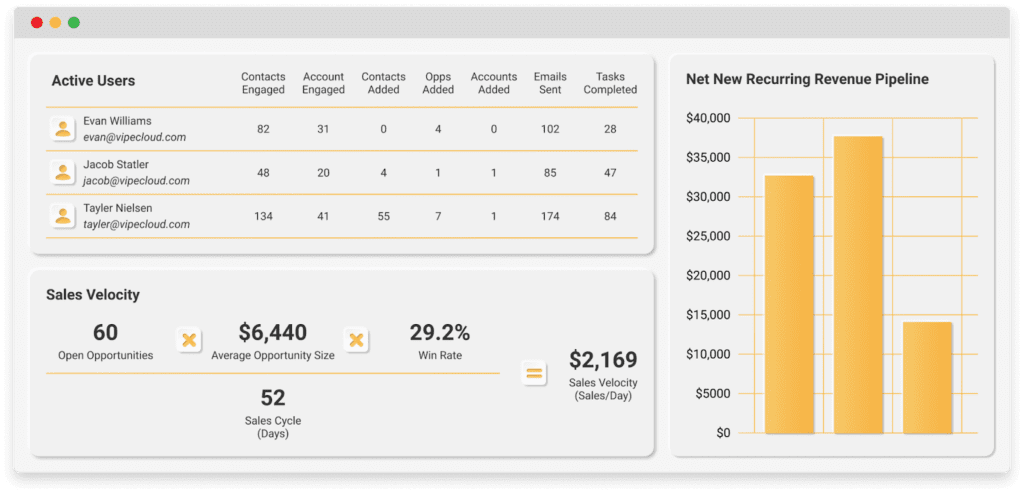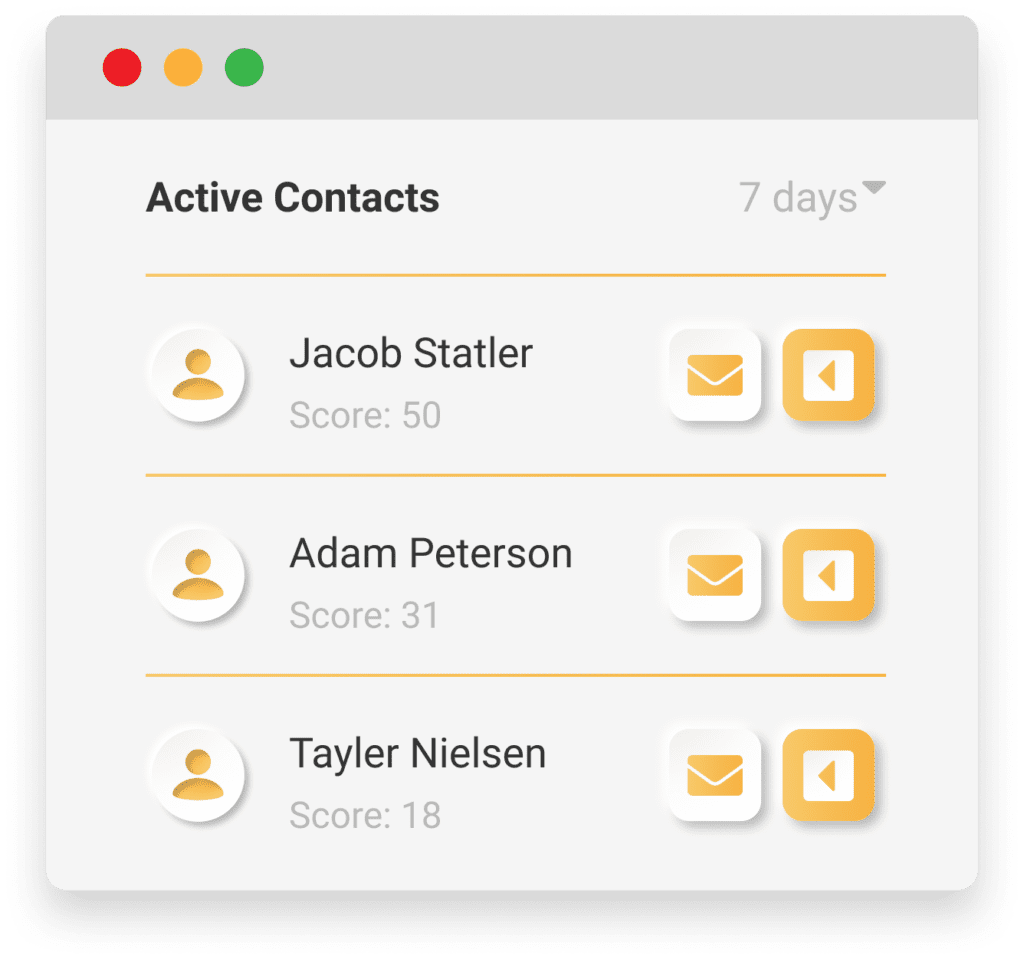Last updated on August 3rd, 2023

Read this post for in-depth statistics about CRM, including eye-opening industry trends. These insights can power your implementation and expand how you use CRM software.
Utilizing a quality CRM is a foundation for successful business workflows, happy customers, and better decision-making for sales and marketing professionals.
If you desire a value-driven relationship with customers, (no matter the industry) then CRM is your cornerstone asset.
And whether your company is seasoned with CRM or new to it, you don’t want to miss these exciting and valuable statistics!
These statistics will 100% justify your company’s CRM investment.
Table of contents:
- Your CRM ROI Can Be Staggering
- CRM Improves Customer Satisfaction & Retention
- CRM Drives Sales Insights
- CRM Improves access to customer data
- Small Businesses CRM Adoption Is Growing
- Marketing Leaders Are Optimizing CX On Multiple Channels
- CRM Is Sometimes Overlooked In Crucial Situations
- CRM Makes Social Engagement Simple
- CRM Strengthens Customer Service
- AI Is The Future
- The CRM Market Is Expanding…FAST!
- Try VipeCloud, A Premier All-In-One CRM

VipeCloud is the only Automation tool your small business needs to
be the hero to your customers.
With Email, Texting, Social, Suites, Chat, Stories, Video Email & Sign Up Forms fully built-in, we provide you with the perfect platform to grow your business.
15 Day Free Trial – Get started risk free. No CC needed.
Your CRM ROI Can Be Staggering
CRM ROI can range from $2.50 to $5.60 per dollar invested in implementing the software and training employees on its use.
There’s also research that shows that ROI can be $8.71 or more for EACH dollar spent.
When growth and revenue are critical measurements of success, making sure you’re investing wisely in business assets can be the deciding factor on your ability to scale.
All-in-one CRMs like VipeCloud make implementation more affordable, leading to a higher return on your investment.
CRM Improves Customer Satisfaction & Retention

CRM can improve customer retention by up to 27%, thanks to the CRM tools you have at your disposal.
These features will usually include:
- Sales automation that helps with sales efficiency
- CRM data to market to leads more effectively
- Account management pipelines that help account executives track customer success
- Multichannel marketing tools that engage customers
- Forms to take in customer feedback
Retained customers are the ones that are happy with your service, right?
So it’s these customers that bring the most value to your company.
Did you know that these satisfied customers bring 2.6x more revenue than just “somewhat satisfied” customers?
And when we take things a step further, satisfied customers bring 14x as much revenue as dissatisfied ones.
In a time when customer experience is paramount, even big corporations take time to make it a priority.
From CRM customer support to social engagement tools, companies directly correlate quarterly earners with customer satisfaction.
A Capterra study even found that 47% reported customer satisfaction shot up (along with customer retention) when they adopted a CRM system.
CRM Drives Sales Insights

1/2 of sales teams use data for accurate forecasts, and it’s no secret that CRM provides sales analytics you can draw conclusions from.
Think about it…
If we look at VipeCloud’s sales reporting tool, it gives you an overview of your team’s win rates and overall sales velocity. Then, based on past data, you can forecast how future deals will go if your sales and marketing strategies remain the same.
The truth is 50% of your prospects aren’t a good fit. However, knowing past conversion percentages and shared characteristics of those who converted can help you niche your target audience further.
Here’s a Pro tip: Use CRM lead scoring to help prioritize the right leads who are a good fit. Even 68% of marketers believed lead scoring was a top revenue contributor.

CRM Improves Access To Customer Data

74% of businesses mentioned that CRM has improved how they access customer data.
Customer data isn’t just helpful for information-gathering purposes.
It can also power sales and marketing.
How?
For sales, data helps pinpoint your ideal buyers, helping you score leads more accurately
And with marketing, customer data helps you craft and segment marketing campaigns based on commonalities shared (industry, job title, etc.) in your database.
As a matter of fact, “segmentation” is simply a way to scale “personalization”.
An Epsilon study found that 80% of consumers have a higher chance of buying when they’re going through a personalized experience across marketing and sales.
Small Businesses CRM Adoption Is Growing
Research shows that only 9% of businesses with at least 10 employees aren’t leveraging CRM software.
So we can conclude that more and more businesses are taking advantage of the simple CRM adaptability.
Even one-man-band solopreneurs can use CRM to market their offers and track the progression of their clients.
Marketing Leaders Are Optimizing CX On Multiple Channels
Almost 70% of marketing leaders admit that they constantly compete for the optimal customer experience (CX).
And one of the critical pillars of the customer experience is omnichannel engagement (aka multi-channel marketing).
It can include:
- Email marketing
- Social sharing
- Text message marketing
Automation is a significant asset with omnichannel marketing since you can rinse and repeat past successful campaigns.
For example, suppose a past drip campaign consisting of a 3 email sequence and 2 text messages converted a demographic at a high percentage. In that case, you can repeat that campaign on a newer audience and perhaps change your offer or wording.
The Pedowitz Group even reported that 86% of senior-level marketers agreed on the importance of multichannel customer touchpoints.
CRM Is Sometimes Overlooked In Crucial Situations
If you’re late to the CRM adoption fest, don’t feel alone, because 22% of those in sales aren’t familiar with customer relationship management, to begin with.
So their typical default is to have scattered software from different vendors (which can get pricey).
You’ll also find organizations without CRM tend to rely on outdated methods like manually tracking their customer information and interactions.
It becomes a lot harder to forecast deals and even prioritize the right leads with this approach.
So a solution is keeping your information all in one place, while ensuring the data is as up-to-date as possible.
And it’s this access to accurate data which helps shorten the sales cycle by 8-14%, according to a 2015 Nucleus Research report.

CRM Makes Social Engagement Simple
Data suggests that nearly one-quarter of all customers interact with preferred brands via social media channels.
And with social media’s rate of expansion, you can’t neglect to interact with customers in the manner they prefer!
Social media is where customers advocate for brands, voice their concerns and provide feedback.
Did you know that simply answering a social media complaint can increase customer advocacy by up to 25%.
So because of that, all-in-one CRMs have created social media integration tools, allowing you to engage with your audience simply from your CRM suite.
With VipeCloud, you can meet your target market on their preferred platform with scheduled social posts and videos.
This opens the door for social selling, a marketing approach that 31% of B2B professionals reported helped them build stronger connections with clients.
CRM Strengthens Customer Service
Customer relationship management provides tools like ticketing, contact history, and pipelines to help you manage customer needs.
This historical data builds support confidence in not only the customer but also your staff.
Roughly 68% of customers reported that it’s important to them when customer service reps are already familiar with their previous issues.
And almost three-quarters say that if a company can’t provide that for them? They’re likely to switch to a company that can.
Luckily contact databases allow you to track customer history and also write notes about them.
Customer history information can have its merits in sales too.
For example, if one of your reps is following up with a lead that a previous rep handled, they’ll have all the information they need to engage with them accurately.
(Which beats asking the same questions that the other rep did in previous interactions).
AI Is The Future
There has been a significant increase in overall interest in AI-based CRM technology.
While still in its infancy, CRM customer data trends mined by AI could give much more valuable insight into customer behavior.
Smarter technology will lead to the ability to analyze much more complex customer information from omnichannel data and interaction history.
The CRM Market Is Expanding…FAST
The CRM market is projected to reach $96.39 billion by 2027, while other outlets like Global Newswire see it reaching 113.5 billion by that year, thanks to compound annual growth (CAG) of 11.6%.
But with such fast advancements, future artificial intelligence potentials, and customization capabilities, this number shouldn’t be too shocking.
Try VipeCloud, A Premier All-In-One CRM
CRM today is far different from the CRM suites of just a few years ago. The consistent improvement in processing power, data analytics, sales tools, and omnichannel marketing, makes it a household name for a myriad of businesses.
So if CRM implementation is new to you or you’re looking to migrate, VipeCloud’s Sales and Marketing Suite is your perfect landing spot.
Gain access to marketing and sales capabilities that keep you competitive!
As your CRM vendor, VipeCloud releases new features consistently along with support resources to ease the learning curve.
Try VipeCLoud’s Sales & Marketing Suite today for a free 15 days.
Want to see a demo of it in action? Request one here.

Leave a Reply